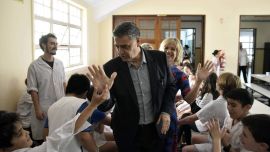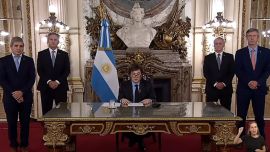Lawmakers in the Senate have approved the Mauricio Macri administration's Budget for 2019, one that will cut social spending and raise debt payments to meet conditions agreed in securing a credit-line from the International Monetary Fund (IMF).
After more than 12 hours of debate the vote on the spending blueprint for 2019, which had already passed the lower house of Congress last month, was 45 in favour, 24 against and one abstention.
Senator for Santa Cruz province, Eduardo Costa, was the only Cambiemos (Let's Change) lawmaker to vote against the proposal, saying "the project does not guarantee funds to reactivate [dormant] public works [projects]" in his province.
Unions and civic groups protested outside the Congress building during a debate that lasted into the wee hours of Thursday.
Macri welcomed the result of the vote on Thursday.
"This is something we set out to achieve for a majority of Argentines who understand that we have to begin to be responsible, serious, that we cannot continue to live above our means," he said.
IMF spokesman Gerry Rice told reporters in Washington that passage of the budget law was a "very positive step" that "points to a clear commitment by the Argentine authorities and a broad spectrum of Argentina's political forces to strength the country's economic policies."
Rice also said that IMF chief Christine Lagarde is likely to meet President Macri during the Nov.30-Dec.1 G20 summit of world leaders that will take place in Buenos Aires.
Ex-president and sitting senator for Buenos Aires province, Cristina Fernández de Kirchner, said the budget would only "deepen the suffering of the Argentine people."
"What we are going to do with this budget is deepen the suffering of Argentine society, and it will be a useless sacrifice," she said. "We all know that the recession is going to deepen."
Pro-government Senator Luis Naidenoff called it an "emergency budget" forced by economic problems that include a slumping GDP, high inflation and rising unemployment.
Predictions
The budget approved on Thursday by the upper house projects a 0.5 percent slide in GDP and a 23 percent inflation rate by year-end, down from 44 percent this year.
It will also cut the primary deficit before debt payments to zero — down from 2.6 percent of GDP this year.
Critics say it slashes social spending by 35 percent once inflation is accounted for. It also calls for a 50-percent increase in debt service payments in peso terms.
The cuts were called for in a US$6.3 billion addition to an earlier US$50-billion IMF credit line. The bail-out is supposed to help Argentina recover from an economic crisis that has seen the peso lose half of its value this year.
Swathe of cuts
President Mauricio Macri has pledged a swathe of cuts in healthcare, education, science, transportation, public works and culture next year to the tune of US$10 billion.
To halt the collapse of the peso back in April, Macri's government reached a bailout deal with the IMF, with which Argentina had practically severed relations after defaulting on its foreign debt in 2001.
Street protests have reflected growing public anger after Macri slashed traditionally safe civil service jobs as part of a bid to cut the fiscal deficit and tame inflation at the IMF's behest.
The budget deficit was 3.9 percent of GDP last year. The government aims to get it down to 2.7 percent in 2018 and zero by the end of next year.
Macri's Cambiemos (Let's Change) coalition lacks a majority in Congress so it needed support from part of Peronists in the Justicialist Part (PT) Justice Party to get the budget passed.
The budget "calls for sacrifice as part of a crisis that blew up everything. Voting against it would send a very bad signal at the international level," said Miguel Ángel Pichetto, head of the PJ bloc in the lower chamber.
The protests outside the chamber were less boisterous than street unrest triggered by the vote in the lower chamber last month, which at one point caused debate to be suspended.
"The people are against this budget. They were against the idea of asking the IMF for a loan. But no-one hears us," said one of the demonstrators, Ana Maria de Jesus, 67.
Despite all the complaints, the vote Thursday went smoothly as Macri has reached agreement with provinces and their governors on providing them with financing even with all the spending cuts.
The vote came a day after S&P cut Argentina's long-term foreign and local currency ratings to 'B' from 'B+' following a review dating back to August.
"There has been an erosion of Argentina's economic growth trajectory, inflation dynamics, and debt profile following setbacks in implementing its challenging economic adjustment programme," S&P said.
- AFP/AP





















Comments